
Ellas Otha Bates McDaniel, known professionally as Bo Diddley, was an American guitarist and singer who played a key role in the transition from the blues to rock and roll. He influenced many artists, including Buddy Holly, Elvis Presley, The Beatles, The Rolling Stones, The Animals, George Thorogood, Syd Barrett, and The Clash.

"Mannish Boy" is a blues standard written by Muddy Waters, Mel London, and Bo Diddley. First recorded in 1955 by Waters, it serves as an "answer song" to Bo Diddley's "I'm a Man", which was in turn inspired by Waters' and Willie Dixon's "Hoochie Coochie Man". "Mannish Boy" features a repeating stop-time figure on one chord throughout the song.
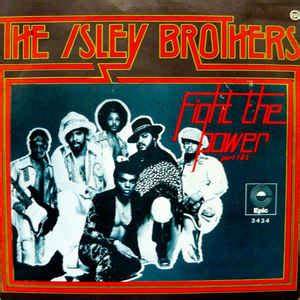
"Fight the Power" is a song recorded by the Isley Brothers, who released the song as the first single off their landmark album, The Heat Is On. The song is notable for the usage of the word bullshit, which was censored during radio airplay.
Teach Me Tonight is a popular song that has become a jazz standard. The music was written by Gene De Paul, the lyrics by Sammy Cahn. The song was published in 1953.
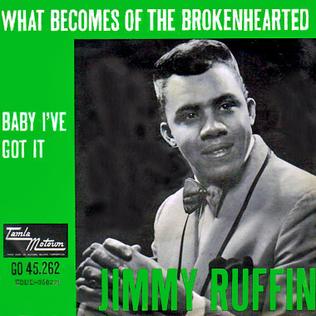
"What Becomes of the Brokenhearted" is a hit single recorded by Jimmy Ruffin and released on Motown Records' Soul label in the summer of 1966. It is a ballad, with lead singer Jimmy Ruffin recalling the pain that befalls the broken-hearted who had love that's now departed. The song essentially deals with the struggle to overcome sadness while seeking a new relationship after a breakup.
"In the Chapel in the Moonlight" is a 1936 popular song written by Billy Hill, and first performed by Shep Fields.
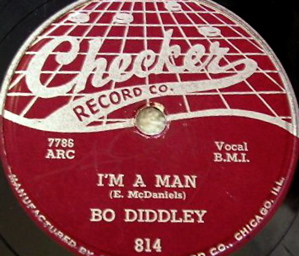
"I'm a Man" is a rhythm and blues song written and recorded by Bo Diddley in 1955. Inspired by an earlier blues song, it was one of his first hits. "I'm a Man" has been recorded by a variety of artists, including the Yardbirds, who adapted it in an upbeat rock style.

"Break It to Me Gently" is a pop song written by blues musician Joe Seneca with lyrics by Diane Lampert. Both Brenda Lee and Juice Newton met with considerable success with their versions of the song.

"Bo Diddley" is a song by American rock and roll pioneer Bo Diddley. It introduced the rhythm that became known as the Bo Diddley beat and topped the Billboard R&B chart for two weeks in 1955. The song is included on many of Diddley's compilation albums including Bo Diddley (1958) and His Best (1997). Buddy Holly recorded a version that became his highest charting single in the UK.

"Travelin' Man" is an American popular song, best known as a 1961 hit single sung by Ricky Nelson. Singer-songwriter Jerry Fuller wrote it with Sam Cooke in mind, but Cooke's manager was unimpressed and did not keep the demo, which eventually wound up being passed along to Nelson. His version reached No. 1 on the Billboard Hot 100. It was released as a double A-side with "Hello Mary Lou", which reached No. 9 on the same chart. In the United Kingdom, "Travelin' Man", coupled with "Hello Mary Lou", reached No. 2, becoming Nelson's biggest UK hit. Nelson is accompanied on the recording by the vocal quartet, The Jordanaires.

"People Got to Be Free" is a song released in 1968 by the Rascals, written by Felix Cavaliere and Eddie Brigati and featuring a lead vocal from Cavaliere.

"Superfly" is a song by Curtis Mayfield, the title track from his 1972 soundtrack album for the film of the same name. It was the second single released from the album, following "Freddie's Dead ", and reached #8 on the Billboard Hot 100 and #5 on the Best Selling Soul Singles chart. The lyrics celebrate the craftiness and determination of the film's main character. The song plays over the film's closing credits.

"Who Loves You" is the title song of a 1975 album by The Four Seasons. It was composed by Bob Gaudio and Judy Parker and produced by Gaudio. It reached number 3 on the Billboard Hot 100 in November 1975.
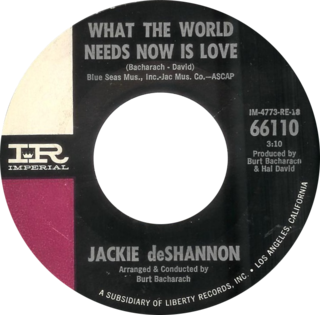
"What the World Needs Now Is Love" is a 1965 popular song with lyrics by Hal David and music composed by Burt Bacharach. First recorded and made popular by Jackie DeShannon, it was released on April 15, 1965, on the Imperial label after a release on sister label Liberty records the previous month was canceled. It peaked at number seven on the US Hot 100 in July of that year. In Canada, the song reached number one.

"You Can't Judge a Book by the Cover" is a 1962 song by rock and roll pioneer Bo Diddley. Written by Willie Dixon, the song was one of Diddley's last record chart hits. Unlike many of his well-known songs, "You Can't Judge a Book by the Cover" does not rely on the Bo Diddley beat. A variety of rock and other performers have recorded renditions of the song.

The Way We Were is the thirty-second studio album by American pop singer Andy Williams, released in the spring of 1974 by Columbia Records and was a return to singing songs that his audience was already familiar with after Solitaire, his previous LP that was less reliant on covers of recent pop hits, did not perform well.

"Don't Let Him Go" is a song written by Kevin Cronin. It was originally released as the opening song for REO Speedwagon's #1 album Hi Infidelity. It was also released as a single, reaching #24 on the Billboard Hot 100 chart. "Don't Let Him Go" has appeared on several REO Speedwagon greatest hits albums.
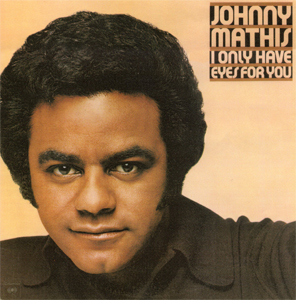
I Only Have Eyes for You is an album by American pop singer Johnny Mathis that was released on May 10, 1976, by Columbia Records and included two new songs, "Yellow Roses on Her Gown" and "Ooh What We Do", which was written specifically for him, as well as a contemporary arrangement of the 1934 title track that foreshadowed his recordings of standards that incorporated a disco beat a few years later.
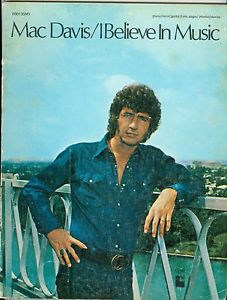
"I Believe in Music" is a 1970 song written and recorded by Mac Davis and later included on his second album I Believe in Music. Gallery covered it in 1972 as the second of three singles off their Nice to Be with You album and the follow-up release to their title track.

"I Guess the Lord Must Be in New York City" is a song written and recorded by singer-songwriter Nilsson in 1969. A track from his fourth studio album, Harry, it became his second charting single.


















